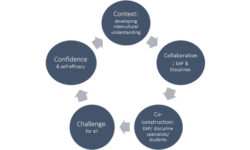Aims and principles
Aims:
-
-
-
-
-
-
- To enable students to take ownership of their own learning
- To surface occluded cultural practices and processes and thereby reduce cultural and linguistic barriers to learning
- To enable students to develop their ability to achieve the ‘appropriate arrangement of both content information and language in order to create extended spoken or written discourse’ (Bruce, 2008: 4)
- To enable students ‘to develop the means to negotiate and respond to the requirements of assignment genres’ (Bruce, 2011: 67)
-
-
-
-
-

Principles:
EAP or academic language and literacy development
-
-
-
-
-
-
- is available to all students
- values the diverse nature of the student cohort and works to be inclusive of all
- is developed in partnership with disciplinary academic programmes
- acknowledges disciplinary differences but builds on cross-disciplinary connections
- is student-centred and driven by student need
- is participatory, collaborative and co-constructed
- is holistic and embodied, acknowledging cognitive, emotional and social factors of learning
- is core to knowledge creation and communication
-
-
-
-
-
Through collaboration with academics in other disciplines, we seek to develop and disseminate insights into areas that, following Ferguson (1997:85), should form the foundations and knowledge base of EAP insessional practice:
-
-
-
-
-
-
- Knowledge of disciplinary cultures and values; a form of knowledge which is essentially sociological or anthropological.
- Knowledge of the epistemological basis of different disciplines; a form of knowledge which is philosophical in nature.
- Knowledge of genre and discourse, which is mainly linguistic in nature.
-
-
-
-
-
References:
Bruce, I. 2008. Academic Writing and Genre: A systematic analysis. London: Continuum.
Bruce, I. 2011. Theory and concepts of English for Academic Purposes. Basingstoke: Palgrave Macmillan.
Ferguson, G. 1997. Teacher education and LSP: The role of specialized knowledge. In: Howard, R. and Brown G. eds. Teacher education for languages for specific purposes. Clevedon, England: Multilingual Matters.
NEXT: Reading list